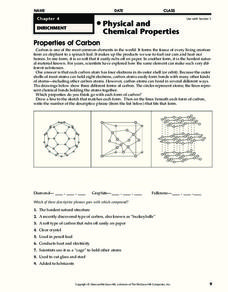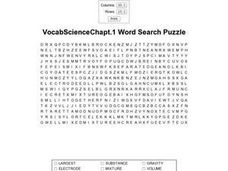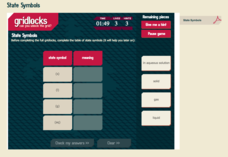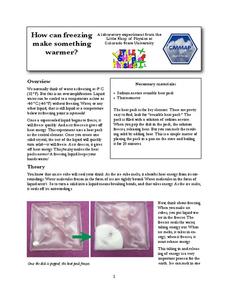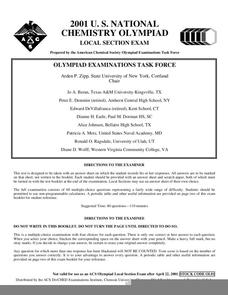Curated OER
Chemical Reactions
For this chemical reactions worksheet, students rearrange the definitions to match the type of reaction and find an example of each reaction. They write the word equation for it and write the type of reaction for three given word equations.
Curated OER
Candy Reaction
In this triboluminescence worksheet, young scholars use wint-o-green Lifesavers to observe a chemical reaction that gives off light. They break a lifesaver up with a hammer and make observations and they chew a lifesaver and make...
Curated OER
The Science of Respiration and Blood Circulation
Fifth graders study how respiration and circulation are connected. In this respiratory lesson students complete several activities to better understand heart rate and carbon dioxide in the body.
Royal Society of Chemistry
Investigating Temperature Changes on Evaporating Liquids—Microscale Chemistry
Is there more to evaporation than just less liquid? Show young scientists the energy transformation that occurs during a phase change through a series of simple experiments. Lab partners place drops of water, ethanol, and ethoxyethane on...
Curated OER
How Do Atoms Stick Together?
In this chemical bonding worksheet, learners answer 76 questions about compounds, Lewis dot structures, intermolecular forces between atoms, electronegativity and bonding and types of bonds.
Curated OER
ATP in a Molecule
In this cell energy worksheet, learners review how ATP is formed and broken down and the uses of cell energy. This worksheet has 8 fill in the blank and 2 short answer questions.
Curated OER
Chemical Compounds
In this chemical compounds worksheet, students identify the types of intermolecular forces present in the given substances, calculate the heat required to convert a liquid to gas, and explain the ideal-gas law. This worksheet has 5...
Curated OER
Chemical Reactions
In this reactions worksheet, students state the differences between a coefficient and subscript and an exothermic and endothermic reaction. Students review the different types of reactions. This worksheet has 13 short answer questions.
Curated OER
Physical and Chemical Properties
In this length worksheet, students read about the properties of carbon. Students also decide which of the given phrases go with which compound.
Curated OER
The Ties that Bind
In this bonding worksheet, students read about the types of bonds that hold compounds together. They are given fifteen common materials and they identify the types of bonds that hold each together.
Curated OER
Boot Reer Root Beer
Fifth graders investigate chemical reactions. In this physical science lesson, 5th graders make dry ice root beer and identify the type of change that occurs to the root beer mixture.
Curated OER
Vocab Science Chapter 1
In this word search worksheet, students locate 20 words related to science. The word list includes volume, mixture, and solute.
Virginia Department of Education
Molecular Model Building
During this hands-on activity, young chemists build molecular models based on the Lewis dot structure before studying valence shell electron pair repulsion theory.
Curated OER
Energy and Matter
A review of a full unit on energy and matter, this slide show starts with basic definitions of states of matter and their mass. It then develops the ideas of the forces that that matter can exert. Details about bonding within matter and...
Curated OER
Gumdrop Crystal Models
A great way to learn about molecular structures is to make a model. Gumdrops and toothpicks are used to construct crystal models. The models are based on theories of crystal shapes that occur because of positive and or negatively charged...
Science Geek
Reaction Kinetics
Show your classes the science behind rates of reactions with a presentation that explains factors that affect the rate, activation energies, exothermic and endothermic processes, and the proportionality of the product and reactant rates.
Curated OER
Summary of Organic Reaction Mechanisms Needed for AS Chemistry
Advanced chemistry courses typically cover organic reactions. On this reference sheet, the five types of organic reaction mechanisms are explained and an example is shown. For each, there is also a diagram of the chemical reaction that...
Normal Community High School
Mole Calculations
You didn't know you'd find moles in chemistry class! Through the introduction of moles and molar volume at STP, classes see how to calculate moles using a given chemical equation. The presentation includes a short review of ions in...
Royal Society of Chemistry
State Symbols
When water is a solvent in a chemical equation, we consider it an aqueous solution. Scholars match the name of four states of matter to their proper symbol in a chemical equation. Four puzzles provide repetition to help pupils remember...
Colorado State University
How Can Freezing Make Something Warmer?
Crazy fact—freezing liquid actually gives off heat! Young scholars investigate the transfer of energy when liquids freeze using a chemical heat pack. The heat pack gives off heat as its liquid core freezes.
Royal Society of Chemistry
Forensic Tests
Flame tests determine if there is a specific metal in a chemical compound. Young forensic scientists review their understanding of flame tests and hydroxide precipitates by solving puzzles. The timed review encourages mastery.
Curated OER
The Chemistry of Life
After studying the different aspects of atoms and their reactivity, pupils will find this summary PowerPoint useful for review. Some of the slides are informative with labeled diagrams; others give important vocabulary. Teachers may want...
Curated OER
2007 U.S. National Chemistry Olympiad Local Section Exam
Sixty multiple choice questions cover the entire gamut of chemistry concepts. This is the local section of the U.S. National Chemistry Olympiad, where your chemistry candidates take a shot at entering the national competition. They...
Curated OER
2001 U.S. National Chemistry Olympiad - Local Section Exam
Sixty multiple-choice chemistry questions make up this comprehensive exam used for the 2001 US National Chemistry Olympiad. Every topic that you would expect to approach in a general chemistry class is queried on. You could easily use...










